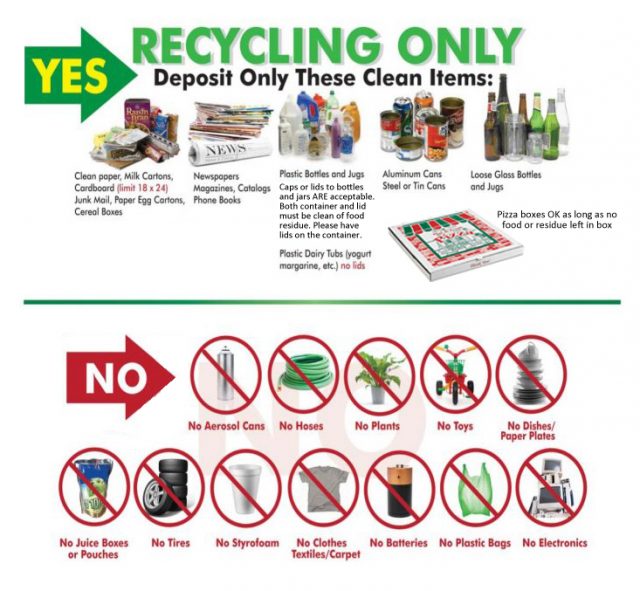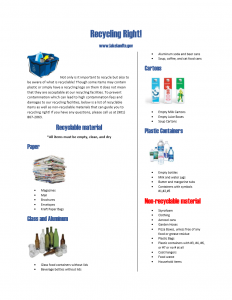Yes to clean glass containers, but no to plastic grocery sacks, say Lakeland officials about recycling in the City.
To avoid costly contamination fees, Lakeland is asking residents to monitor their recycling efforts with specific guidelines on the Dos and Don’ts.
Alejandra Arriaga, Lakeland staff engineer, said Memphis Recycling decides what materials are recyclable and non-recyclable based on their equipment and the ability to sell the commodity.
She said clean glass bottles and containers can be put in the recycling container but grocery sacks should be taken to other locations which accept them.
“Plastic grocery bags are recyclable but they require a different collection system and processing equipment that is not available at our current recycling facility,” said Ms. Arriaga.
“We encourage residents to take their grocery/retail plastic bags to drop-off locations that accept these plastic bags where they will be recycled at the appropriate facility. The following link provides useful information on recycling plastic bags and a search directory where residents can input their zip code to find the closest retail stores and grocery stores where plastic bags are accepted: https://www.plasticfilmrecycling.org/recycling-bags-and-wraps/ .”
She added, “If residents would like to reduce the amount of single use plastic bags they use, they are encouraged to bring their own reusable grocery bags when shopping.
“Glass containers and bottles (and any other recyclable item) are recyclable but they must be clean and dry. The metal lids on the glass containers are not recyclable at the recycling facility.”
Contamination fees
According to Ms. Arriaga, over the last year, material buyers (primarily China) have implemented stringent minimum acceptable contamination levels in the bales of material they receive. Link: https://www.citylab.com/environment/2019/04/recycling-waste-management-us-china-national-sword-change/584665/.
She said Memphis Recycling has had problems with buyers rejecting loads of materials because they exceed the new contamination standard.
“The Memphis Materials Recovery Facility, operated by Memphis Recycling, is a fully automated facility. Plastics with food or grease residue, yard waste, plastic bags, coat hangers or any other non-recyclable material cannot be automatically rejected by the recycling equipment. The contaminated material passes the system and is baled with the “good” material. Due to the volume of contaminated material coming into the facility, Memphis Recycling has had to hire people to pre-sort the material by hand to remove any contaminated material as well as spot check the bales before they are shipped out of the facility.”
The cost of the additional labor is being passed on to municipalities whose loads exceed 10% contamination by load, said Ms. Arriaga. In April, Memphis Recycling began charging a fee of $150 for every contaminated ton. The City of Lakeland’s processing fee for “clean” recyclables is $117.30 per ton, so for a contaminated load the City is charged a total of $267.30 per ton. For the months of April and May, the City of Lakeland was charged $6,864 in just contaminations fees.
So why bother with recycling?
“Lakeland believes in the importance of keeping a clean and green community and recycling is an essential part of sustaining the cleanliness and livelihood of our community and the environment,” said Ms. Arriaga.
“Recycling provides the opportunity to reduce the amount of waste sent to a landfill and instead diverts items to be recycled into new products. The City is required by the State to divert 25% of waste generated annually in the City.
“The environment is impacted less because less water, energy and other natural resources are used in the recycling process rather than producing new items. Recycling also helps create jobs in the recycling and manufacturing industries in the United States.”
Hang tag program
Last week, the hang tag program began as an initiative to inspect recycling bins to reduce the amount of contaminated bins that would be picked up by recycling trucks and reduce contamination fees, said Ms. Arriaga. “Inspecting bins allows the City of Lakeland to see what materials are being mistakenly placed in recycling bins. Styrofoam, plastic bags and plastic containers with #3, #4, #6 and #7 on them were largely being mistaken as recyclable material.”
Emily Harrell, city engineer, said, “If the bin contains items which are not acceptable, a yellow hang tag will be placed on the bin identifying the unacceptable item(s). Team Waste will not collect the bin until the item is removed. All unacceptable items should be placed in your household trash bin.”
Link to hang tag story: https://lakelandcurrents.com/recycling-changes-effective-immediately/
Bulk pick up
For citizens with large items to be removed, the City offers a bulk waste pick up service: https://www.lakelandtn.gov/index.aspx?NID=400












